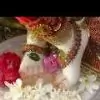Originally posted by: vishmewell
I would rather not call "HIndu" a religion because it is way of life. HIndu Philosophy is based on Karma theory. Good Karma, Bad Karma. In layman's words, one's rewards in life or sufferings are equal proportions to one's own acts.
One determines their own destiny according to Hindu Philosophy.
Yudhishtir aka Dharma Raj the oldest of Pandavas who is an ICON for truth and dharma fell for the temptation and obsession of gambling and lost his riches, then his army, then his whole kingdom. But that did not even stop him from ending the gambling game until he gambled away his brothers one after the other and at last even Daupadi his crowned queen and wife.
Although Pandavas were chosen to be favorites of Lord Krishna, still were exiled for 13 years. Could Lord Krishna not averted their exile? He could, but would not as Dharam Raj did Sauda of his brother's and wife. Hence, must pay for his actions.
First, Sadhana in Bidaai also has to go into exile for her misjudgment and not testifying in favor of Ranvir because she could not lie. Dharam Raj also faced similar challenge during Kurukshetra war. Lord Krishna himself prompted Dharma Raj to shout a lie "Ashwadhama Athaha, Kunjaraha" the kunjaraha was rather in a low tone to establish dharma. May be not lying for a good cause or dharma is also not good?
Secondly, as Dharam Raj's actions of gambling away his brother's and wife are deemed fit, so is Sadhana's making sauda of marriage is also deemed fit. Hence the burning in fire?
It is only the epic Sita of Ramayan in the human form who remained unharmed by fire!
Thus justice of karma theory always prevails! These aspects of Mahabharat and Ramayan are depicted very well in Bidaai.
Also, beautifully established that a mother is mother. She can never do harm to her own children. Sometimes taking tough stand is a necessary evil as a mother's role.
Mahabharat is a very complicated Epic. It's not really truth vs. falsehood rather it has many grey shades.
Yudhishtir , did lie,
He did say ashwathdhama was killed ( and hten he said slowly , the elephant) even though dhron did not hear that part and his rath ( chariot, yudishter's) came down and fell upon the earth like other chariots because it counted as a lie. Before that when ever he travelled his chariot was an inch above the ground.
He was responsible for Dhron's death.
The whole story is mixed with false priorities. And thus even wariors like dhron, kripacharya, bheeshm, and Karn had to face the consequences.
Pandavas were not really the favorites of Krishna, in reality his favorites were all. He loved even shakuni. In one of the versions, when a magical box was bought to Abimanyu's would be ( i forgot her name) she was the daughter of balram, it showed what ones heart desires.
She saw Abimanyu, her mother saw riches, Balram saw dhuryodhan, and Krishan saw shakuni.
In another narration it was said that shakuni had 100 brothers in a previous birth. Whom Dhuryodhan got Killed by putting them in one room wiht no food and water.
Shakuni was one of them.
So he basically took some flesh from all the 100 brothers thighs and made his pasay (dice) and vowed to destroy dhuryoodhan. So when he came back (rebirth concept) he basically avenged by causing destruction of the entire kaurava, the 100 brothers, cuase he lost his.
=====
About Karma.. well thats Hinduism yes
About Deeds there are other concepts as well: which are prevalent in the Christo-Judaic-Islam traditions
When ever anyone does anything wrong, or good.
He is either rewarded in this life and hereafter
or his good deeds are saved so that he will be rewarded in the hereafter.
So that is why many times we see good people going through many phases of difficulties but yet they are not rewarded because of this concept of hereafter.
Same with wrong,
that when someone does wrong he is either punished here
or his deeds are counted and he gets punished in the hereafter by going to the hellfire.
The concept of accountability is there.. in all religions except there are variations as to how its depicted.




























